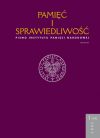Polityka narodowościowa niemieckich władz okupacyjnych we wschodniej Polsce w latach 1941–1944. Przebudowa społeczeństwa wielonarodowościowego
The German Population Policy in Eastern Poland between 1941–1944: Ideologically Race-Oriented Rule of a Caste in a Multi-Ethnic Borderland
Author(s): Frank GrelkaSubject(s): History
Published by: Instytut Pamięci Narodowej
Summary/Abstract: The text discusses the most significant instrument of the National Socialist occupation policy in the multi-ethnic borderlands of Poland (Kresy), using the example of the Jewish and Ukrainian communities. Under the slogan of the New Order of Europe, a violent attempt was made to create ethnically homogeneous areas through the selection, transfer and extermination of people. During the Second World War, this negative population policy became a purposeful and radically implemented element of German eastern policy. Demographic development and migration were interfered with by the occupiers through expropriation and removal of whole groups of population, according to the occupiers’ desired objectives in order to obtain a correspondingly racially valuable population structure. The long-term objective of this occupation policy was to gain Lebensraum (living space) and finally secure biological survival that was exclusively reserved for the Germanic race. For the German occupying force, nationality policy, used in the text in contrast to the National Socialist term Population Policy, was both a cover- -up measure and a completely universal means of transforming the Polish national state into a tribal society. As the war progressed, this arbitrary use of power in the occupied eastern areas for the sake of the German war economy paradoxically became characterised by the fact that the occupiers were destroying exactly the Lebensraum (living space), including its population, which was originally meant as the future resource paradise for the Great Germany. Additionally, on the basis of the Jewish policy (Holocaust) and the relative preferential treatment of the Ukrainian population (ukrainising), it shall be further on demonstrated how the German rule affected the interethnic relations on an everyday basis. In the field of tension between collaboration and ethnic cleansing it becomes clear what kind of hopes were inspired among the representatives of the individual groups, as well as what existential demands on each group at a given time arose in connection with the ideologically race-oriented rule of the caste. To this extent, on the one hand, this study pursues a synthesis of the ideological motives and legitimation, and on the other: that of civilisation break-up and the murderous consequences of the National Socialist policy with regard to the pre-war multiethnic Polish society.
Journal: Pamięć i Sprawiedliwość.
- Issue Year: 14/2009
- Issue No: 1
- Page Range: 71-91
- Page Count: 21
- Language: Polish

